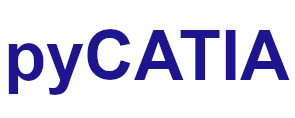pycatia.part_interfaces.thickness¶
Module initially auto generated using V5Automation files from CATIA V5 R28 on 2020-06-11 12:40:47.360445
Warning
The notes denoted “CAA V5 Visual Basic Help” are to be used as reference only. They are there as a guide as to how the visual basic / catscript functions work and thus help debugging in pycatia.
- class pycatia.part_interfaces.thickness.Thickness(com_object)¶
Note
CAA V5 Visual Basic Help (2020-07-06 14:02:20.222384)
System.IUnknownSystem.IDispatchSystem.CATBaseUnknownSystem.CATBaseDispatchSystem.AnyObjectMecModInterfaces.ShapePartInterfaces.DressUpShapeThicknessRepresents the thickness shape.The thickness shape is made up of a collection of faces to process and anoffset parameter.- add_face_to_thicken(i_face_to_thicken: Reference) None¶
Note
- CAA V5 Visual Basic Help (2020-07-06 14:02:20.222384))
- o Sub AddFaceToThicken(Reference iFaceToThicken)Adds a new face to be thickened.Parameters:iFaceToThickenThe new face to processThe followingBoundary object is supported: Face.Example:The following example adds the new face face to thicken for the thicknessfirstThickness:call firstThickness.AddFaceToThicken(face)
- Parameters:
i_face_to_thicken (Reference) –
- Return type:
None
- add_face_with_different_thickness(i_face_to_thicken: Reference) None¶
Note
- CAA V5 Visual Basic Help (2020-07-06 14:02:20.222384))
- o Sub AddFaceWithDifferentThickness(ReferenceiFaceToThicken)Adds a new face to thicken with a different offset value.Parameters:iFaceToThickenThe new face to processThe followingBoundary object is supported: Face.Example:The following example adds the new face face to thicken with a differentoffset value for the thickness firstThickness:call firstThickness.AddFaceWithDifferentThickness(face)
- Parameters:
i_face_to_thicken (Reference) –
- Return type:
None
- property faces_to_thicken: References¶
Note
- CAA V5 Visual Basic Help (2020-07-06 14:02:20.222384)
- o Property FacesToThicken() As References (Read Only)Returns the collection of faces to be thickened.Example:The following example returns in list the list of faces of thethickness firstThickness:Set list = firstThickness.FacesToThicken
- Return type:
- property offset: Length¶
Note
- CAA V5 Visual Basic Help (2020-07-06 14:02:20.222384)
- o Property Offset() As Length (Read Only)Returns the thickness offset.Example:The following example returns in offset the offset of the thicknessfirstThickness:Set offset = firstThickness.Offset
- Return type:
- remove_face_with_different_thickness(i_face_to_remove: Reference) None¶
Note
- CAA V5 Visual Basic Help (2020-07-06 14:02:20.222384))
- o Sub RemoveFaceWithDifferentThickness(ReferenceiFaceToRemove)Removes an existing thickened face.Parameters:iFaceToRemoveThe face to removeThe followingBoundary object is supported: Face.Example:The following example removes the existing face thickened face from thethickness firstThickness:call
- Parameters:
i_face_to_remove (Reference) –
- Return type:
None
- set_volume_support(i_volume_support: Reference) None¶
Note
- CAA V5 Visual Basic Help (2020-07-06 14:02:20.222384))
- o Sub SetVolumeSupport(Reference iVolumeSupport)Set support of Thickness feature.
- Parameters:
i_volume_support (Reference) –
- Return type:
None
- withdraw_face_to_thicken(i_face_to_withdraw: Reference) None¶
Note
- CAA V5 Visual Basic Help (2020-07-06 14:02:20.222384))
- o Sub WithdrawFaceToThicken(Reference iFaceToWithdraw)Withdraws an existing thickened face.Parameters:iFaceToWithdrawThe face to withdrawThe followingBoundary object is supported: Face.Example:The following example withdraws the existing face thickened face from thethickness firstThickness:call firstThickness.WithdrawFaceToThicken(face)
- Parameters:
i_face_to_withdraw (Reference) –
- Return type:
None
